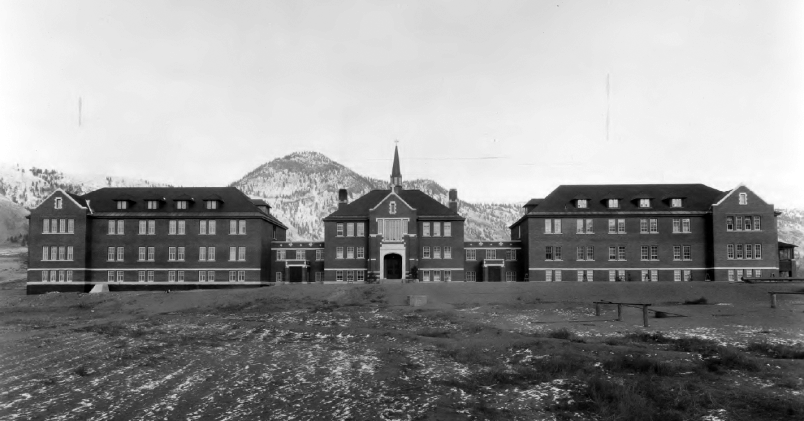The clampdown on free expression in Canada that began during the Covid pandemic shows no signs of abating. Prime Minister Justin Trudeau’s government has continued to pursue legislation that accords the state greater control over both new and old media. The latest is a proposal to criminalize “residential-school denialism.” This concept, formulated by academics Daniel Heath Justice and Sean Carleton, encompasses any questioning of the official narrative about the history of Canadian government-sponsored schools for indigenous children, which were run in collaboration with various Christian churches (the last such school closed in 1996).
The phrase “residential-school denialism” obviously suggests an analogy with Holocaust denial, which was outlawed in Canada last year, but no one denies the historical reality of the schools. Instead, what “denialism” refers to here includes everything from doubting the applicability of the term “genocide” to residential schools to highlighting any positive aspects of the schools to placing them in their historical context.
The notion of residential-school denialism has now made its way from academia to the center of Canadian power. In recent months, both Minister of Immigration Marc Miller and Attorney General David Lametti have stated they would take seriously the proposal to add residential-school denialism to the criminal code. This proposal gained momentum in the wake of an international furor around the 2021 discovery of a purported mass grave of indigenous children, detected by ground-penetrating radar, at a school in Kamloops, British Columbia. Well before that, the residential-school system had figured centrally in Canadian politics, with politicians promising action to achieve “reconciliation” with the indigenous population in every recent election. Despite millions spent on commissions, land-claim settlements, and countless other initiatives, the desired reconciliation seems more elusive than ever.
“The story has morphed into a shared myth that all Canadians are expected to affirm.”
At the time, most Canadians, myself included, assumed that the children whose bodies had supposedly been detected at Kamloops had been summarily buried to conceal brutal maltreatment at the hands of the racist staff of the school. But as time went by, some critically minded people pointed out glaring inconsistencies in the mass-grave story. To date, no human remains have been unearthed from the site, and there is doubt that it is even a graveyard at all.
Regardless, the story has morphed into a shared myth that all Canadians are expected to affirm without question. Some who have refused to do so, like academic Frances Widdowson, have lost their reputation and employment as a result. The proposed addition of “residential-school denialism” to the criminal code is, in effect, an attempt to make dissenting views like Widdowson’s not just career-ending, but illegal.
Fundamental questions of national identity are at stake in this dispute. Canada was built on an awkward compact between three founding nations—the British, the French, and the indigenous peoples with whom both groups negotiated countless land treaties and transfers. For a long time, the compact held together under the domination of a decidedly British political and cultural identity. Since the 1960s, when the death of the British Empire brought Canada closer to the ascendant American imperium just to the south, Canadian identity has been in crisis. Urbanization, deindustrialization, and high rates of immigration have combined with ongoing Americanization to hamper the nation’s ability to construct a new collective identity. Canada’s federal government presides over one of the most decentralized federations in the world, a situation made all the more difficult without a strong national vision and ethos. The Canadian constitution even makes economic cooperation between provinces difficult—indeed, many Canadian provinces have a closer relationship with neighboring American states than with one another.
Trudeau’s government has identified an alternative means by which Canada’s government can retain some legitimacy in the eyes of the public: by presenting itself as a defender of the weak and vulnerable, over and against a demonized Other who threatens them with harm. During the pandemic, this was the justification for harsh restrictions on citizens: Such measures were needed to “protect the vulnerable” from the callous anti-vaxxers and anti-maskers, just as indigenous Canadians must now be protected from “denialists.” The villains and victims may change, but the basic story remains the same. Overall, this approach seems to work. Most Canadians approved of Trudeau’s Covid policies, and most accept the government’s line when it comes to the alleged mass grave.
It is far easier to condemn long-dead racists who ran the residential schools and accuse those who have any doubts of condoning child murder than it is to engage in the tragic, yet complicated, real history of the schools. But morality tales work. People need overarching narratives, and most of the older ones have lost their resonance. This is one of the dangers of Canada’s loss of a coherent identity: It has opened the door to new myths that justify ever greater limitations on freedom.
